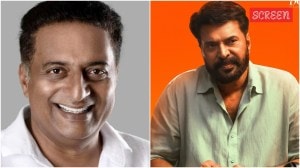Yeltsin eyes two elections
Boris Yeltsin, in typical unpredictable style, dismissed his entire Cabinet on March 23. The four principal figures in the dismissed Cabinet...

Boris Yeltsin, in typical unpredictable style, dismissed his entire Cabinet on March 23. The four principal figures in the dismissed Cabinet, Prime Minister Viktor Chernomyrdin, First Deputy Prime Minister in charge of economic affairs Anatoly Chubais, First Deputy Prime Minister Boris Nemtsov, and Minister for Interior Anatoly Kulakov were particular targets of Yeltsin’s criticism in the pre-dismissal pronouncement of March 21.
Yeltsin has selected Sergei Kiriyenko to be Acting Prime Minister. This young technocrat was in charge of the fuel and energy portfolios in the Chernomyrdin Cabinet. Yeltsin dismissed the Cabinet on the basis of his authority under the post-Soviet Constitution which gives the President absolute authority to determine the Cabinet’s tenure.
Kiriyenko has only been appointed Acting Prime Minister. The new Prime Minister and Cabinet will need the approval of the Duma (Parliament). This legislative approval can be a dicey prospect, with the Communist Party of the Russian Federation andother factions opposed to Yeltsin in a majority. The saving grace is the enormous executive authority of the Russian presidency which will temper inclinations in the Legislature to challenge Yeltsin at this stage. Indications are that Chernomyrdin will bring himself with political preparations for the parliamentary elections of 1999 and the presidential elections of 2000. Chernomyrdin is considered a leading candidate to succeed Yeltsin as Russia’s President. Indications are that Chubais will have responsibilities outside the new Cabinet.The Cabinet’s dismissal is a watershed in Russian politics since the Soviet Union’s break-up. The first Prime Minister of the Russian Federation was the young, pro-western economist Yigor Gaidar whose inclination towards speedy modernisation without taking Russia’s economic ground realities into account caused administrative and economic disruptions and ended in his removal.
Chernomyrdin, a former chief of Soviet public-sector monopoly Gazprom, was Prime Minister for nearlyfive years. His tenure was characterised by comparative political stability and a certain economic equilibrium. He presided over privatisation and economic modernisation by balancing Russia’s inherent fiscal and managerial limitations with the requirements of organisational and managerial reforms. But his endeavour was apparently not successful and, more importantly, not sufficiently responsive to the growing concerns of the Russian people.
Though Yeltsin did not spell out the reasons for the dismissal in the official decree, in his public statement of March 23 he criticised the government for economic mismanagement. He asserted that the new government would have to be more decisive and energetic in tackling economic reforms. The deeper reasons for the current political turmoil necessitate a review of developments over the last seven years. The perestroika initiated by Gorbachev, followed by the excessively rapid move to privatisation in the early years of the Russian Federation, destroyed the structuralcohesion and the already uncompetitive productive capacities of the Russian economy. This was compounded by the country losing its economic hold and markets in Eastern Europe, the Central Asian Republics and many African and Asian countries, especially the large Indian market with India’s own economic reforms. The investment and technological inputs expected from the Western democracies have not flowed into Russia because of the essentially competitive and market-driven American and West European policies.
The complex task of introducing modern banking and fiscal-management techniques and reorganising major privatised industries could not be effectively managed because Russia did not have the required technical and managerial experience. While some privatised sectors have boomed, this has generated critical imbalances in distribution. The vast majority of the people, whose basic needs were secure under the Soviet system, have felt a sense of deprivation. Most importantly, the armed forces and public-sectoremployees have not been paid full salaries for many months. Chernomyrdin’s sustained efforts did not perhaps stem the increasing disaffection among government employees, armed forces and the public in general.
The increasing linkages of East European economies with Western Europe and America’s and other important industrial countries’ enhanced economic involvement in the Central Asian economies could not be countered by a Russia afflicted by problems of internal economic transitions, as well as political problems. Despite Russia’s enormous natural resources and technical skills, its export capacities and currency remained under pressure from the ongoing processes and globalisation.
The political dimensions of these crises must have been of equal concern to Yeltsin. There is angst among Russians at losing their superpower status. Russian nationalism is traumatised and desirous of reassertion. This is reflected in the electoral successes of the Communist Party and other forces opposing Yeltsin. He has alsohad to face factionalism within his own party and violent centrifugal political movements in areas like Chechnya and Dagistan. NATO’s expansion and America’s politico-economic orientation towards Russia are of strategic concern despite the practical and realistic equations which Russia is trying to forge with the US.
It is in this overall background that Yeltsin wishes to consolidate his party’s position and ensure a succession he desires during the remaining two and a half years of his tenure. The timing of the dismissal is particularly related to Duma elections, due in 1999, and the presidential elections.
How Russia emerges from these problems is of deep interest to India both in foreign-policy terms and in terms of the strategic trends which will emanate from these developments. Despite Russia’s diminished status, it will remain an important power centre in our regional context and in bilateral terms. It still is a major market for Indian goods and an important source for defence supplies andtechnologies. After the pro-western enthusiasm immediately after the Soviet Union’s break-up, Russian foreign policy has veered around to acknowledging the importance of ties with Asian powers such as China, India and Iran. The conviction has reemerged that Russia’s capacity for creating a strategic equilibrium with the West depends on strengthening this Asian equation. India should realise the importance of this undercurrent in Russian foreign policy and respond within the framework of Indian interests.



- 01
- 02
- 03
- 04
- 05




























